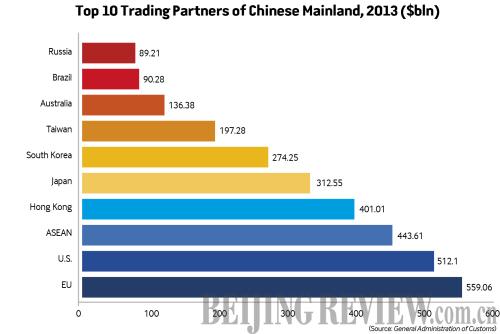|
Zhang Monan, an associate research fellow at the China Center for International Economic Exchanges, said a structural upgrading is also happening in global service trade.
In recent years, service trade has become more dependent on the development of knowledge-, technology- and capital-intensive industries, such as telecommunications and finance, computer software and data processing, rather than on traditional labor- or resources-intensive service industries such as tourism and sales services.
In China, traditional industries like tourism and transportation still make up the bulk of its service trade, while knowledge- and capital-intensive sectors are relatively weak compared to developed countries. Despite the fact that high value-added industries like insurance and finance have registered robust growth in the past few years, they are far from being capable of playing a leading role, said Zhang.
"Compared with trade of goods, growth in China's service trade is much slower. Improving competitiveness in that regard is a must for China at a time when the country is marching toward being a stronger trading nation," Bai said.
"To support export-oriented service companies, the government should, under the rules of the WTO, grant preferential policies, such as more convenient registration procedures for businesses, introducing clients to them, holding exhibitions to enable them to meet with potential clients and helping to solve disputes between them and their foreign counterparts," Bai suggested.
Zhang Xiaoyu, a researcher with the Chinese Academy of International Trade and Economic Cooperation, said a "strong trading nation" is not something that a country should deliberately pursue, but should be a natural outcome after having adjusted their domestic economic structure.
"A country's trade structure is in line with its domestic economic structure. Only when China carries out domestic industrial upgrades and economic rebalancing can it improve its overall trade structure," Zhang told Beijing Review. "It's bound to be a long process."
"High-end service exports, such as financial services, cultural products and technology transfer, are China's weakest links. Also, China's service sector is not as opened up as the manufacturing sector. This problem should be addressed."
A frequent target
China's foray into the global trade market has not always gone smoothly. It has been the most targeted nation in anti-dumping investigations for 18 consecutive years and countervailing investigations for eight consecutive years.
Bai said it's inevitable for a big trading nation to become a frequent target of trade disputes.
"It's not just an issue for China. When Japan and the Four Asian Tigers emerged as big trading nations, they were faced with the same problem. Till today, trade disputes between the United States and Japan or South Korea still occur frequently."
"The tallest tree is the one most swayed by the wind," Bai said. "Since the financial crisis, trade protectionism has become increasingly severe. Restrictions on import quotas from China imposed by other countries are aimed at saving their own economy."
Zhang said China should treat trade protectionism rationally.
"China's peaceful development has broken up the previously established balance. How to increase trading strength while getting along with trading partners is a tough issue China has to face."
"China does lag behind developed countries in terms of advanced trading concepts, environmental protection and labor protection standards. We should constantly learn from them and shoulder our responsibilities," Zhang said.
"As painful as it is, it will bring about a better outcome. China's trade development should be based on structural adjustment and should be healthy and sustainable. Only when we are willing to give up some current interests can future gains be secured," Zhang said.
Email us at: zhouxiaoyan@bjreview.com


| 